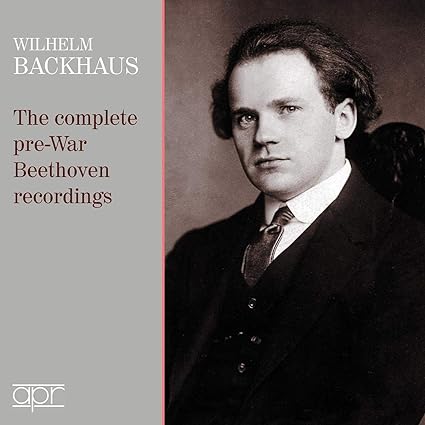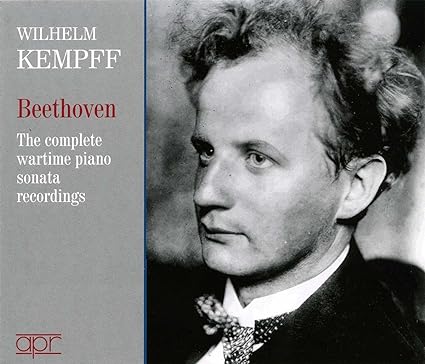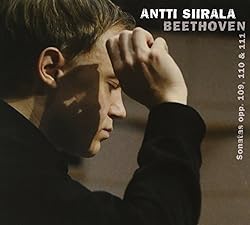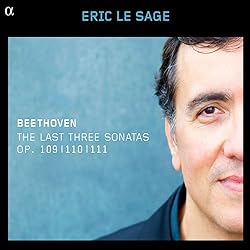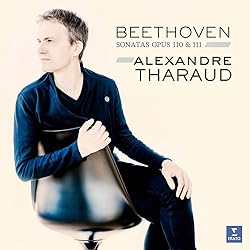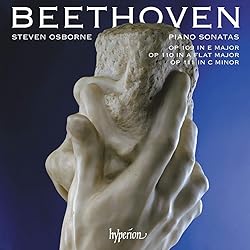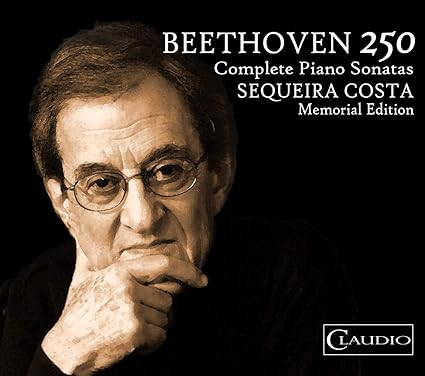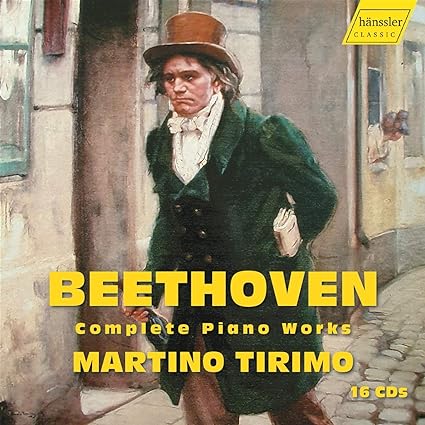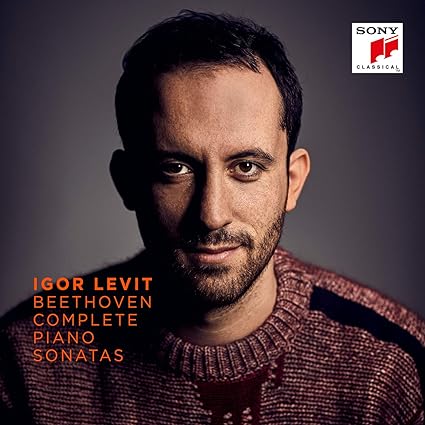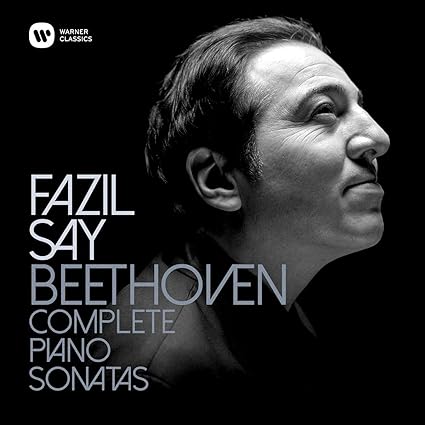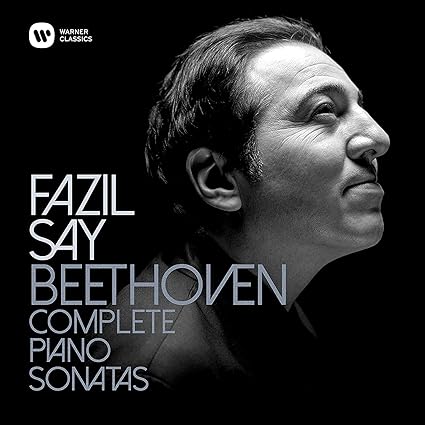I've not done a proper shootout for a while, so why not do so with four new to me versions of the last three sonatas of old Ludwig van. I just picked up the Osborne, and I had sort of forgotten about the other three, which I picked up at the start of the year.
Op 109
Siirala - Fast in both the opening movement and Prestissimo, with nice left hand accents in the opening movement. The final theme and variations also sounds speedy and a bit congested in a few places, with the fifth variation a bit rough, perhaps. Less transcendent and more direct.
le Sage - More measured, but hardly slow in the opening movement. More nuanced, with greater dynamic variation and a smoother sound. The Prestissimo is quick and more varied than Siirala. The final theme and variations is slightly swifter overall, but le Sage mixes tempi and style more, and achieves a more transcendent, late-LvB sound. He really takes care to play with no little beauty. I had middling expectations going in, and man, they were surpassed.
Tharaud - Fast, clean, light and perhaps a bit too elegant in the opener. There's less bite to the accents than either of the two prior versions. The Prestissimo whizzes by, with admirable clarity, but not enough weight. The theme and variations is serene, beautiful, poised, well played, and boring, especially when he plays slow for effect. The movement kind of meanders. Whiff.
Osborne - Quick, but not too quick, to open. A brighter sound than the others, but it's just about right. Some accenting verges on the too hard and metallic, but never gets there. Clean playing. Near perfect dynamics. The Prestissimo is fast and fierce, but not rushed, with Osborne varying more widely in tempo than the others. The loudest passages do become strident, but not ugly. He starts the last movement with an Andante theme that is perfectly paced, beautiful, and of the transcendent variety, which then goes further in that direction as the movement progresses, promising good things for 111. Osborne's loudest playing again veers toward the hard, but he manages to keep the right sound and feel, and the coda is serene and all late LvB goodness.
Osborne and le Sage essentially tie in this one. Color me surprised.
Op 110
Siirala - Siirala opts for a moderately timed opening movement, but that masks some significant tempo variations. While he certainly generates an at times lovely sound and never just rushes, the speed and style saps a bit of the late LvB magic. The Allegro molto is paced just right, and the left hand playing is delightful but dynamic contrasts don't excite. Siirala opens the final movement with a solemn and lovely recitative and arioso that takes on the late LvB sound I like. Tempo choice are just right, and dynamic contrasts to start are just nifty. Much of the rest of the movement doesn't really live up this, with rather weak repeated chords, for instance, but the inverted fugue is just magnificent. Sort of a mixed bag take overall.
le Sage - le Sage goes for a quicker overall first movement. His tempo shifts are basically flawless, and he generates a sound elevated, lovely, and fleet in perfect proportions. The pianist then dashes off the Allegro molto and something closer to a Presto tempo, with superb dynamic contrasts and clarity. It's middle period Beethoven brought forward, and it works splendidly. le Sage keeps with a similar approach in the opening sections of the last movement, and in the fugue, he plays quick but with a rounded tone, generating more tension than expected, and then returns to a tenser second arioso. After nice repeated chords and an even nicer transition to the inverted fugue, le Sage plays with some urgency before ending with a potent coda. A superb version.
Tharaud - Tharaud's overall timing is close to Siirala, and he plays more elegantly, but sort of more surface-y. Indeed, the entire movement is quite beautiful, with each section wonderfully played, but something goes missing. In the Allegro molto, Tharaud starts off slow and quasi-heavy, to ill effect. The entire movement sounds held back. In the final movement, Tharaud plays the ariosos beautifully, with an uncommonly potent transition to the second one, and while the fugues are clear and the repeated chords before the second one are potent, and everything sounds tidy, the playing seems to miss the spirit of the music. Bummer.
Osborne - Osborne opens with the slowest opening movement of the bunch. It manages to sound more transcendent than the rest and more beautiful in the quieter passages. Osborne's piano sounds brighter at mezzo forte and above, which is no problem, especially when the playing truly sounds so truly cantabile. Osborne's meticulous control over dynamics yields uncommonly effective forte playing near the end, and it also makes the fast Allegro molto more jolting when it arrives, with forte accents looking forward to the opening movement of Op 111. Osborne then starts the last movement with a transcendent recitative which segues into an even more transcendent arioso. Buried in the mix, or not so buried, really, are micro-dynamic variations of the most ear-catching variety. The fugue starts off all light and clean, the builds up in tension and power before quickly receding back to the second arioso, which this time sounds more solemn. The repeated chords build up masterfully, from a near silent whisper to a not quite thundering forte, but the tradeoff here is a transition to the inverted fugue that is crazy good. The tempo picks up considerably, going from very slow to nearly dizzyingly fast, resulting in an exceptionally fine coda. Hot damn!
Osborne by a country mile, in one of the great recordings of the piece. le Sage, well, he again vastly exceeded my expectations.
Op 111
Siirala - A dark, strong Maestoso transitions via nice 'n' rumbly left hand notes to an Allegro of somewhat measured tempo some of the time, and nifty speed where it counts, with even niftier sforzandi. The movement is well put together. The Arietta sounds processional and serious to start, but not especially transcendent. Siirala then plays the second half slower and injects some serenity into the mix. He seems to lighten the interpretive burden, as it were, when he moves into the first variation, which sounds simultaneously middle and late Beethoven. The second variation sounds snappier, and the third is zippy but not really boogie woogie. As he moves into the late variations, the playing doesn't sound particularly transcendent, but it is supremely well executed. The "little stars" sound quite lovely, and Siirala knows how to play trills, displaying enviable evenness, and his left hand playing sounds extremely fine and weighty without being overbearing. The final chain of trills display extremely fine dynamic variation between voices. An excellent rendition, if not a Top 20 choice. The disc as a whole is quite good. I would not object if Mr Siirala opted to record the cycle.
le Sage - The Maestoso sounds brighter and more oriented toward the right hand, and it also assume a more elevated air than Siirala. The Allegro has more left hand heft, and le Sage's quicker overall tempo generates more energy and drive. It manages to sound lighter and deeper at once. In the second movement, le Sage takes a slower overall tempo, and he starts with a slow, somber, processional, and transcendent Arietta. Not content with the slow tempo of the first half, le Sage slows things down even more in the second half, doing the time suspension thing, and then the first variation very slowly emerges after a masterfully handled note by note transition. The tempo picks up markedly, but not in an exaggerated way, in the bouncier second variation, and the boogie woogie variation has sufficient boogie and ample woogie. le Sage then performs a quick transition to more a transcendent sound, initially underpinned by a steady but not obtrusive left hand. His "little stars" are slow and accented in such a way as to result in a stiff but mightily effective sound. Nice. le Sage picks up the tempo a bit afterward, and while some of the louder music has real oomph, he delivers the most bestest playing at the quieter end of the spectrum, even when, or especially when, the dynamic levels vary. His trills are quite fine, if not as even as Siirala's, and the effect is much more satisfying. The only complaint comes with the coda, which ends up sounding fairly blunt, though still elevated. Overall, this is an extremely fine performance, one suitable for shoot outs with Big Names, and the disc simply smooshed my expectations going in. I almost think I should write Mr le Sage a letter demanding that he record the rest of the sonatas.
Tharaud - Tharaud starts the Maestoso in punchy fashion, with the close and somewhat dynamically compressed recording* amplifying the effect. Tharaud's tempi are nicely selected in the Allegro, being neither too fast, nor too slow, but drama, bite, sting, energy, etc, are not up to snuff. Even the boldest sforzandi don't really satisfy. It's not an enervated recording, it's just not particularly good. The Arietta is slow and well done, and the first two variations are pretty nice. The third variation is played very swiftly, too swiftly, and lacks the kind of rhythmic sensibility I prefer. The rest of the movement is played very swiftly, more swiftly than I like in some places, and Tharaud adopts an annoying mannerism playing some repeated notes much louder than the gentle surrounding figurations, completely altering the balance of the music. It's unique, and some people may like, but it misses for me. The chains of trills are well played but too rushed. Pretty much everything misses for me. (* I purchased the 24/96 download of the Tharaud, and it's sound, while very good, isn't the best among this batch, let alone in a broader context.)
Osborne - Osborne launches right into the Maestoso, with his hard-hitting, steely forte belted out aggressively. He backs off a bit, then rips right back into the piece in one of the more aggressive takes I've heard. Not all is steel and bite, but a lot is, and it's invigorating. Osborne also sees no need to dally as he brings the movement in at a tight 8'24". Osborne then starts off with a brisk Arietta, with some nice bass underpinning - not too much, and definitely not too little. He manages to make the music have that late-LvB sound I like while going a bit quick. He then imperceptibly shifts to a slower second half, which sounds more elevated yet. The variations start off with a first variation that is almost optimally transcendent while also forward moving and ever so slightly swifter than I would typically prefer. Ditto the second variation. The third variation is fast and jagged and has some of the fierceness of the opening movement. Nice. Afterward, the piece transitions into transcendent LvB, with gentle yet brilliant "little stars", often lovely tone, a often flowing sound, though one where Osborne knows when to emphasize a left hand arpeggio just so, or up the volume just the right amount. The chains of trills vary a bit, often sounding soft and gentle, but not always, and some left hand notes get delivered with a bit more emphasis, though nothing like what Tharaud does. The harder hitting, brighter playing returns as Osborne ratchets up the tension expertly right up until the final chain of trills, which almost becomes part of an extended coda, coasting along musically until an Elysian end. Superb. I don't know if it's Top 10 superb, but Top 20 seems a sure bet. Maybe I need to do a months long comparison of all the 111s I own. Anyway, another grade A disc from Mr Osborne.
This shootout sort of confounded expectations. I had none for Siirala really, but I expected great things from Tharaud and ho-hum things from le Sage, but got exactly the opposite. I expected great things from Osborne and more or less got what I expected. A mixed bag overall, with two new really fine additions to my collection.
Amazon UK links:
Siirala:
https://www.amazon.co.uk/dp/B0076JSOA6/?tag=pinkfishmedia-21
le Sage:
https://www.amazon.co.uk/dp/B00LEZP4VU/?tag=pinkfishmedia-21
Tharaud:
https://www.amazon.co.uk/dp/B07FVFL6F7/?tag=pinkfishmedia-21
Osborne:
https://www.amazon.co.uk/dp/B07NBDQXCW/?tag=pinkfishmedia-21


